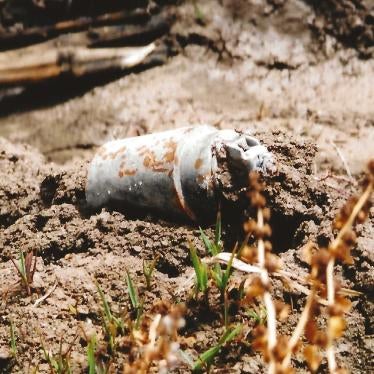Geneva, Switzerland
Thank you once again for the opportunity for the ICBL to present a global overview on stockpile destruction. The ICBL's Landmine Monitor has prepared a fact sheet, focusing on key developments in the past year, that forms the basis for much of this intervention. Copies are available outside the room.
By our count, a total of 85 States Parties have completed the destruction of their stockpiles, collectively destroying 43 million antipersonnel mines. We heartily congratulate Indonesia and Ethiopia for completing their stockpile destruction programs, both ahead of their four-year deadlines.
Indonesia, which serves as co-rapporteur of this Standing Committee, is especially to be praised for completing its destruction nearly three years in advance of its deadline. In November 2008, it finished destruction of 11,603 antipersonnel mines. This is truly in line with the treaty's obligation to destroy stockpiled mines "as soon as possible," and is an excellent example for others to follow.
Ethiopia announced on 2 April 2009 that it completed the destruction of its stockpile of 55,569 antipersonnel mines, in advance of its 1 June 2009 deadline. It has not yet formally informed other States Parties of its completion of this obligation and has not submitted an Article 7 transparency report in 2009 with details of the destruction.
In their initial Article 7 reports, Haiti and Palau officially indicated that they do not stockpile antipersonnel mines.
A number of countries reported on newly discovered stockpiles of antipersonnel mines: Afghanistan, Bulgaria, Burundi, the Republic of Congo, and Tajikistan. All but Burundi reported on the subsequent destruction of the mines.
Landmine Monitor estimates that about 13 million antipersonnel mines remain to be destroyed by five States Parties that still have to complete their stockpile destruction programs: Belarus, Greece, Kuwait, Turkey, and Ukraine. Iraq may also have stockpiles of antipersonnel mines (more on that later).
A year ago, we received the alarming news that three of these States Parties-Belarus, Greece, and Turkey-were in violation of one of the treaty's core obligations: the duty to destroy all stocks as soon as possible but no later than four years after joining the treaty. We now find ourselves a year later in more or less the same situation. While we hope to get meaningful updates from each of these countries later today, we still don't know when each country will finish, and collectively they still have more than 6 million mines to destroy. Belarus has not destroyed any; Greece has destroyed about 170,000 (or 10% of its stock); and Turkey has destroyed about 1.2 million (about 40% of its stock). Where is the recognition of urgency in each of these states? We have heard from each state that they are committed to complying as soon as possible, but we have not seen a corresponding increase in the pace of activities that reflects such determination.
We do recognize that there have been positive developments in each country in the past year, but we believe the situation warrants a much faster and concentrated effort to destroy the mines than has been observed. Taking each case individually:
Starting with Belarus, we are very pleased to learn that Belarus agreed to the Terms of Reference paper, enabling the European Commission to proceed with preparing the call for tenders. And Belarus submitted two reports earlier this year on developments. At the same time, discussions with the EC were concluded at a frustratingly slow pace, leading one to wonder if there was a firm commitment to finding a timely solution on either side. We now need to see the EC act with all possible speed to organize a tender and enable destruction to begin. We challenge Belarus and the EC to ensure that such destruction begins before the 2nd Review Conference.
We are also pleased to know that Turkey has destroyed all the fuzes of its mines, rendering them unusable in their present form, and that already 1.2 million mines have been destroyed.
Turkey has also been generally transparent about its destruction activities, inviting the ICBL, ICRC, and the ISU to visit its plant and providing information about mines destroyed at the 9MSP, again in March, and through its Article 7 report. We understand that capacity limits at the Turkish Munitions Disposal Facility mean that the predicted end-date for destruction is in early 2010, but we strongly encourage Turkey to find a way to boost the destruction rate and to finish by the 2nd Review Conference.
Turning to the last of the non-compliant states, we recognize that Greece has stepped up the rate of transfers of its mines to the Bulgarian plant where they will be destroyed. But this is far too little too late. We were told a year ago that the destruction was likely to be finished by now. Then we heard that it would be done by the end of this summer. Now we are told that only the transfers will be finished by October, and the actual destruction at some unknown point afterwards. We are deeply concerned that this deadline will slip, and we are deeply concerned about the lack of transparency on the reasons for the delays and the efforts to redress any problems. We challenge Greece to ensure that the stocks will all be destroyed by the 2nd Review Conference and to find supplementary destruction means if the contracted company predicts it cannot finish by this date.
We believe that States Parties should include in the Declaration that emerges from the Review Conference a statement expressing grave concern that Belarus, Greece, and Turkey missed their deadlines and remain (or remained) in violation for such an extended period of time, and vowing to work together to prevent the recurrence of such a situation.
The next State Party with a deadline is Ukraine. We understand that a technical mission will be made by the EC to see how to support Ukraine's stockpile destruction program, but this still appears to be a drawn-out process with no end in sight. Ukraine clearly stated its needs for cooperation and assistance at the 9MSP, saying that it would only be able to destroy half its stockpile by the June 2010 deadline without international assistance. We now call on Ukraine and its donor partners to ensure that an arrangement is worked out to fulfill this request for assistance without further delay.
Kuwait, with a destruction deadline of January 2012, has not submitted an annual update to its transparency report, thus it is unclear what measures, if any, it has taken to begin destruction of its declared stockpile of 91,432 antipersonnel mines.
Iraq stated in its initial Article 7 report in 2008 and its annual update in 2009, "As reported by the different ministries and other role players, Iraq holds no stockpiles of Anti-Personnel Mines. However, this matter will be further investigated and if required, corrected in the next report." Thus, it remains uncertain if Iraq has stockpiled antipersonnel mines that must be destroyed within the four-year treaty deadline.
To end on a positive note, we would like again to congratulate Indonesia and Ethiopia for completing their destruction.
Thank you.






